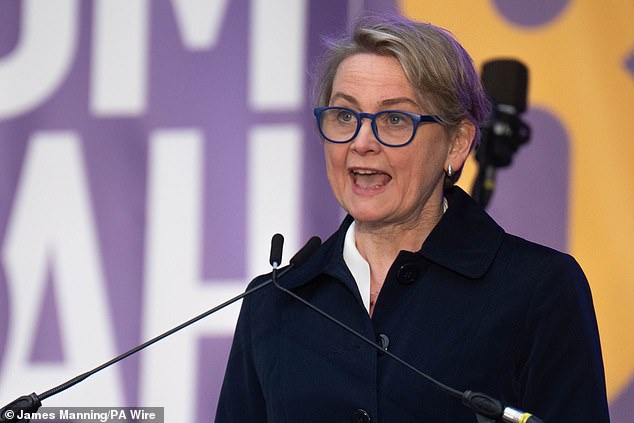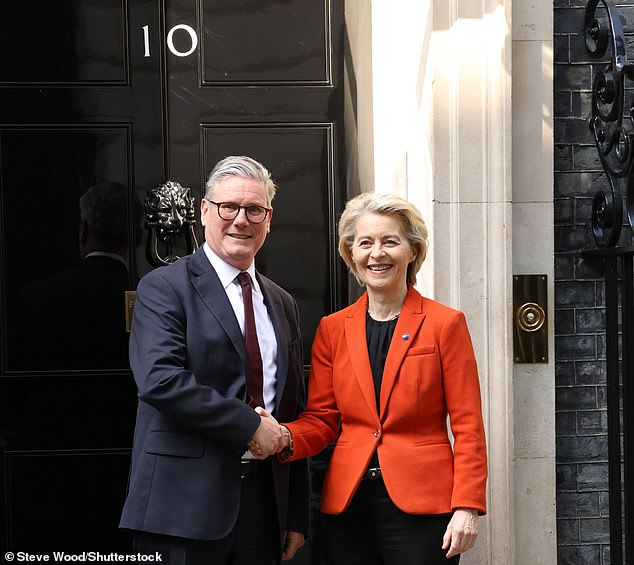Keri Starmer could unveil a youth mobility scheme with the European Union allowing thousands of under-30s to work in the UK after winning over Yvette Cooper.
The Home Secretary is said to be willing to consider a ‘one in, one out’ or capped operation, having previously been opposed to any type of exchange over fears it would affect the current astronomical net migration figures.
The Prime Minister, who met European Commission president Ursula Von der Leyen in London yesterday, could unveil a scheme for those aged 18 to 30 within weeks, the BBC reported last night.
But it will not happen before the May 1 elections, where Labour is battling Nigel Farage‘s Reform UK for English council seats and the Westminster constituency of Runcorn and Helsby.
Ministers including Chancellor Rachel Reeves are said to be in favour of a scheme that could help economic growth without crossing the government’s red line blocking full freedom of movement.
And German ambassador to the UK Miguel Berger told BBC Radio 4’s Today programme this morning: ‘I am now pretty optimistic that we are moving in a good direction.’
The Times, which first reported Ms Cooper’s softening of opposition, suggested EU citizens coming to the UK under the scheme could be legally barred from seeking asylum, as a defence against abuse if the EU admits countries like Albania and Serbia.
A Home Office source told the paper: ‘Yvette’s primary objective is to reduce net migration and any discussion about visa schemes needs to be seen in that light.’

The Home Secretary is said to be willing to consider a ‘one in, one out’ or capped operation, having previously been opposed to any type of exchange over fears it would affect the current astronomical net migration figures.

The Prime Minister, who met European Commission president Ursula Von der Leyen in London yesterday, could unveil a scheme for those aged 18 to 30 within weeks, the BBC reported last night.

Ministers including Chancellor Rachel Reeves are said to be in favour of a scheme that could help economic growth without crossing the government’s red line blocking full freedom of movement.
Downing Street said that ‘both sides are discussing a range of issues’ when asked if there are plans for a youth mobility scheme with the EU.
A Number 10 spokesman said on Friday: ‘We’ve always been clear about the nature of these discussions.
‘Both sides are discussing a wide range of issues which is entirely normal for any negotiation. I don’t think we could have been clearer that this is not about returning to the EU, but we will not be defined by the debates and arguments of the past.
‘What we will be defined by is putting more money in the pockets of working people and providing Britain with long-term stability and security.’
The spokesman later added: ‘The Prime Minister has been very clear about the benefits that a better partnership with the EU can bring and how it can unlock benefits for British people and British business.’
Pushed again on whether the idea of a youth mobility scheme was on the table, the spokesman said: ‘I’m just not going to get into the detail of the discussion that is taking place.’
The Prime Minister welcomed Ms von der Leyen to Number 10 on Thursday ahead of a UK-EU summit next month aimed at ‘resetting’ Britain’s post-Brexit relationship with the bloc.
A Downing Street spokesman last night described Thursday’s meeting as ‘long and productive’, covering areas including Ukraine, energy security, the global economy and defence.
They said: ‘Discussing the ongoing negotiations to strengthen the UK-EU partnership, they both agreed that good progress had been made.
‘They asked their teams to continue their important work in the coming weeks, with the aim of delivering as ambitious a package as possible at the first UK-EU summit next month.
‘The Prime Minister was clear that he will seize any opportunity to improve the lives of working people in the United Kingdom, drive growth and keep people safe – and he believes a strengthened partnership between the UK and the EU will achieve this.’
Labour has committed to improving Britain’s trade deal with the EU, including reducing barriers for food exporters and increasing co-operation on defence.
At the start of Thursday’s meeting, Ms von der Leyen said talks could ‘pave the way’ to the UK joining the Security Action for Europe (Safe) programme that allows EU countries to co-operate on defence procurement.
But the Government has also faced pressure to agree a youth mobility scheme with Brussels, both from the EU itself and its own MPs.
Earlier this week, more than 60 Labour backbenchers urged the Government to negotiate a youth mobility scheme as part of the desired reset with the bloc.
In a letter to Nick Thomas-Symonds, the minister in charge of negotiations with the EU, 62 MPs and 11 peers called for ‘a new and bespoke youth visa scheme’ for UK and European citizens under 30.
In their letter, the MPs and peers said any youth mobility scheme should be in line with the UK’s existing arrangements with countries such as Australia and Canada, with a time limit on visas and a cap on numbers.
They said: ‘A bespoke scheme would extend new cultural, educational and economic opportunities to young people in the UK without returning to free movement.’
The group also called for deeper collaboration with the EU on defence and a deal on sanitary and phytosanitary (SPS) measures to reduce border checks on food products, both of which are in line with Government policy, among other suggestions.
On Wednesday, a group of 62 Labour backbenchers wrote to Nick Thomas-Symonds, the minister in charge of negotiations with the EU, calling for a ‘new and bespoke youth visa scheme’ for UK and European citizens under 30.
But in the Commons on Thursday, Mr Thomas-Symonds said it was ‘not part of our plans’, and the official readout of Sir Keir’s meeting with Ms von der Leyen made no mention of youth mobility.
The UK-EU summit is scheduled to take place on May 19.
A Home Office spokesman said: ‘These are matters for the Cabinet Office. No proposals have been put to the home secretary or suggested by her.’







